 MyDogBreeds
MyDogBreeds Bergamasco is originated from Italy but Basset Fauve de Bretagne is originated from France. Bergamasco may grow 24 cm / 10 inches higher than Basset Fauve de Bretagne. Bergamasco may weigh 20 kg / 45 pounds more than Basset Fauve de Bretagne. Both Bergamasco and Basset Fauve de Bretagne has almost same life span. Bergamasco may have more litter size than Basset Fauve de Bretagne. Bergamasco requires Moderate maintenance. But Basset Fauve de Bretagne requires Low maintenance
Bergamasco is originated from Italy but Basset Fauve de Bretagne is originated from France. Bergamasco may grow 24 cm / 10 inches higher than Basset Fauve de Bretagne. Bergamasco may weigh 20 kg / 45 pounds more than Basset Fauve de Bretagne. Both Bergamasco and Basset Fauve de Bretagne has almost same life span. Bergamasco may have more litter size than Basset Fauve de Bretagne. Bergamasco requires Moderate maintenance. But Basset Fauve de Bretagne requires Low maintenance
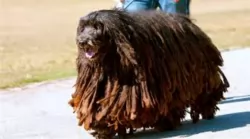 The Bergamasco comes from northern Italy. This medium sized sheepdog is of ancient origin. Known as an Italian sheep herding breed, his name actually comes from the town where he comes from - Bergamo.
The Bergamasco comes from northern Italy. This medium sized sheepdog is of ancient origin. Known as an Italian sheep herding breed, his name actually comes from the town where he comes from - Bergamo.
It was after World War II that there was danger that this breed would disappear as the need for herding and shepherding was diminishing. An Italian breeder, however, Dr. Maria Andreoli, stepped in to save the breed.
It was in 2015 that the American Kennel Club also changed the breed’s status from Miscellaneous to the Herding Group.
 The Basset Fauve de Bretagne from France was introduced to the UK in 1983, and this smallest of the French hounds is rarely seen outside France, and when you do it is in Britain. This French hunting breed belonging to the Hound group in all likelihood descends from the Grand Fauve de Bretagne which is now extinct.
The Basset Fauve de Bretagne from France was introduced to the UK in 1983, and this smallest of the French hounds is rarely seen outside France, and when you do it is in Britain. This French hunting breed belonging to the Hound group in all likelihood descends from the Grand Fauve de Bretagne which is now extinct.
Long ago the dog was used for hunting and there was even a time when it was on the brink of extinction.The breed became very rare but was later bred with the Basset Griffon Vendeen as well as the Wire Haired Dachshund which has resulted in the breed we have today. The first Basset Fauve was imported into the USA in November 2001.
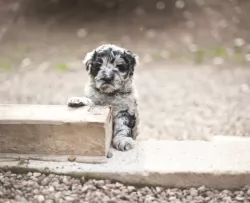 This medium sized sheepdog stands 54 – 62cm in height and weighs up to 38 kg as an adult. It is his coat which draws the most attention. It is of a coarse texture and actually greasy to the touch. It actually forms into strands or almost like dreadlocks from the top of the body, so that people agree he is one of shaggiest dog breeds there are.
This medium sized sheepdog stands 54 – 62cm in height and weighs up to 38 kg as an adult. It is his coat which draws the most attention. It is of a coarse texture and actually greasy to the touch. It actually forms into strands or almost like dreadlocks from the top of the body, so that people agree he is one of shaggiest dog breeds there are.
From age 1 on the coat starts to become woolly, and then the flocks start to form. As these clumps of hair appear, it will become necessary to separate them into smaller cords by hand to ensure attractive formation Brushing isn’t necessary but a big toothed comb can keep their hair ‘groomed’.
The colour of the coat is solid grey with patches of shades of grey and sometimes black. His dense, heavy coat makes it that he is suited to cooler climates. Because he is a herding dog, he wouldn’t do well in an apartment but would suit a home with a large garden.
He is intelligent and social but will need firm handling as he is a boisterous dog. He has a muscular yet compact body with a large head, long tail, high-set semi-drooping ears and large, gentle looking brown eyes. Although not instinctively aggressive, he makes an excellent watch dog with strong protective instincts to protect his human family.
He views new people into his circle with suspicion and wariness. He is good with kids and pets in the home and is playful and energetic.
 The Basset Fauve de Bretagne is a smallish hound, with a long body and deep chest. He is lively and friendly. He is a wire-coated dog, looking similar to a golden cocker spaniel, but his coat is coarse and quite springy and wiry to the touch. He is nimble, he has plenty of courage, he is lively, friendly and amenable. He has short legs, but unlike other Basset breeds, these don’t have that crooked, turned outwards appearance that the Basset Hound has.
The Basset Fauve de Bretagne is a smallish hound, with a long body and deep chest. He is lively and friendly. He is a wire-coated dog, looking similar to a golden cocker spaniel, but his coat is coarse and quite springy and wiry to the touch. He is nimble, he has plenty of courage, he is lively, friendly and amenable. He has short legs, but unlike other Basset breeds, these don’t have that crooked, turned outwards appearance that the Basset Hound has.
The tail is fairly long and held upright when the dog is alert. He has long low-set ears which reach roughly to the end of the nose. The coat is always wheat- or fawn or red in color. The Basset Fauve de Bretagne, also referred to as the Fawn Brittany Basset isn’t quite as low to the ground as the Basset Hound, measuring 32 – 38 cm.
Small, stocky and feisty, this rough-coated Basset is energetic, agile and quick and you’ll find that he gets on well with children as well as other pets in the house. Some training and socialization will go a far way to make him an even more super dog than what he is. He’ll make a wonderful family pet and will adapt well to country living as well as living in the city, if he can rely on you to take him for walks.
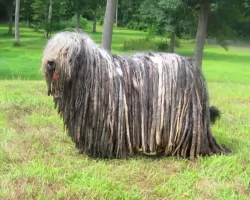 This is a working dog so they are naturally alert. He is also intelligent and independent and this independence is seen with training as he doesn’t take easily to following instructions, becoming stubborn. You’ll certainly want to have your Bergamasco socialized and trained as he can be a boisterous dog, bounding with energy.
This is a working dog so they are naturally alert. He is also intelligent and independent and this independence is seen with training as he doesn’t take easily to following instructions, becoming stubborn. You’ll certainly want to have your Bergamasco socialized and trained as he can be a boisterous dog, bounding with energy.
This is a dog that will need to be kept busy and provided with plenty of activities so that he remains happy, playful and relaxed.
Lively and intelligent, these dogs also form strong bonds with their owners and get on well with the children in the home. He will take well to country life as opposed to living in the city.
 Smart and courageous, the Basset Fauve is such a wonderful pet to have in your home. He is gentle, loving and loyal and will adapt to living in the countryside or the city, so long as he is loved, fed well, exercised and given lots of attention.
Smart and courageous, the Basset Fauve is such a wonderful pet to have in your home. He is gentle, loving and loyal and will adapt to living in the countryside or the city, so long as he is loved, fed well, exercised and given lots of attention.
He was once a serious hunter, but these days he is most content to be friend and protector for his human family.
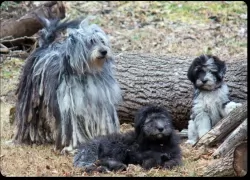 Your Bergamasco can live to be 13 to 15 years of age and he is considered to be a healthy breed. Nonetheless you want to be aware of health issues that are common to this breed
Your Bergamasco can live to be 13 to 15 years of age and he is considered to be a healthy breed. Nonetheless you want to be aware of health issues that are common to this breed
he is vulnerable to heat. He can die of heat exhaustion quicker than other breeds
keep an eye on him for hip dysplasia, progressive retinal atrophy and skin allergies
 The Basset Fauve is free from inherited health problems in the UK and is in fact one of the hardiest of the Basset group. Like all Basset type breeds, as a dog owner you’ll have to keep an eye on your Basset Fauve as he can develop back problems as he gets older.
The Basset Fauve is free from inherited health problems in the UK and is in fact one of the hardiest of the Basset group. Like all Basset type breeds, as a dog owner you’ll have to keep an eye on your Basset Fauve as he can develop back problems as he gets older.
When it comes to your Basset Fauve’s health, make sure he gets all his shots, starting from when he is a puppy. Many of the dangerous canine diseases can be prevented with vaccines.
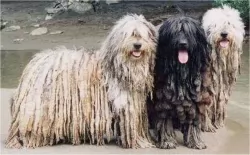 The Bergamasco isn’t a shedder but his coat will need to be combed once a week just to keep it in order. You don’t want to bath him too often, especially during the Winter as his coat takes a long time to dry. It isn’t recommended to shave a Bergamasco as the coat regulates the dogs temperature – keeping him warm and cold as the weather demands.
The Bergamasco isn’t a shedder but his coat will need to be combed once a week just to keep it in order. You don’t want to bath him too often, especially during the Winter as his coat takes a long time to dry. It isn’t recommended to shave a Bergamasco as the coat regulates the dogs temperature – keeping him warm and cold as the weather demands.
They thrive on a blend of kibble (dry) mixed with raw and-or moist food once or twice a day. Remember to include quality chicken, turkey, etc. mixed with some vegetables and rice into your dog’s diet. Ensure a constant supply of fresh water in an easily-cleanable bowl.
Balls and ropes are important for building muscle strength and burning energy. Remember your Bergamasco is a working breed and will need plenty of games and exercise.
 The Basset Fauve is easy to maintain, and all that is required from you is to brush his wiry coat at least twice a week to remove all loose hairs. Look out for too much hair in the ear passage and remove it. The teeth should be brushed a couple of times a week with a dog toothpaste and brush to avoid plague build-up and the claws should also be trimmed.
The Basset Fauve is easy to maintain, and all that is required from you is to brush his wiry coat at least twice a week to remove all loose hairs. Look out for too much hair in the ear passage and remove it. The teeth should be brushed a couple of times a week with a dog toothpaste and brush to avoid plague build-up and the claws should also be trimmed.
Daily walks will be imperative for your Basset Fauve as he is an energetic dog and will need regular exercise. Just ignoring his energetic side will make him frustrated, bored and even destructive.
This breed of dog used to hunt small game and so he is lively and energetic. Because of this he will need a high-quality dog food. Always buy the best commercially manufactured dog foods and speak to your vet about the best one, and whether dry- or wet foods would best suit your canine friend. You want to provide your pet with variety, and it is imperative to include some raw- and cooked meat to his regular dog food to ensure he doesn’t battle with an itchy, dry skin.
Dog foods suited to age, activity levels and stage of life can ensure your dog is always energetic, full of life, healthy and happy and not prone to putting on weight. Always ensure that clean, cool water is constantly available to your pet.
If you get a puppy from a reputable breeder, they will tell you what the puppy’s feeding schedule has been. Make sure to stick to the same routine for a while so that your puppy doesn’t have any tummy upsets.